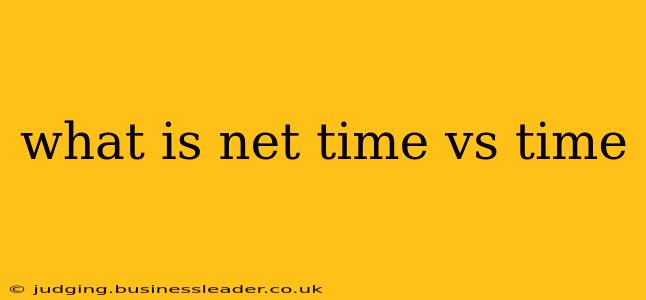Net Time vs. Time: Understanding the Difference
The terms "net time" and "time" are often used interchangeably, leading to confusion. However, they represent distinct concepts, particularly in contexts like project management, scheduling, and even personal productivity. The key difference lies in what is included and excluded from the measurement. Let's break it down:
Time: This is the broad, general term referring to the total duration of an activity or event. It encompasses everything from start to finish, without any subtractions or adjustments. Think of it as the gross duration.
Net Time: This refers to the actual or productive time spent on a task or activity, excluding any interruptions, breaks, or unproductive periods. It represents the pure, focused effort dedicated to achieving a specific objective. You could consider this the effective working time.
What Factors Distinguish Net Time from Total Time?
Several factors can significantly affect the discrepancy between net time and total time:
- Interruptions: Phone calls, meetings, emails, or unexpected visitors can disrupt workflow and reduce net time.
- Breaks: Scheduled breaks for rest, meals, or personal needs are vital but reduce the overall net time dedicated to a specific task.
- Downtime: Technical issues, delays, waiting for resources, or periods of inactivity contribute to total time but not net time.
- Multitasking: Although often perceived as efficient, multitasking often diminishes net time dedicated to any single task due to context switching and reduced focus.
How is Net Time Calculated?
There's no single formula for calculating net time; it depends on the context and the specific factors to exclude. However, a general approach involves:
- Record Total Time: Track the overall time spent on the activity from start to finish.
- Identify and Measure Interruptions/Breaks: Note the duration of interruptions and breaks.
- Subtract Interruptions/Breaks: Subtract the total duration of interruptions and breaks from the total time. The resulting value is your net time.
Example:
Let's say you allocated 8 hours to complete a project. However, you had a 1-hour meeting, a 30-minute lunch break, and experienced 45 minutes of unexpected downtime due to software glitches.
- Total Time: 8 hours
- Interruptions/Breaks: 1 hour + 30 minutes + 45 minutes = 2 hours and 15 minutes (or 2.25 hours)
- Net Time: 8 hours - 2.25 hours = 5.75 hours
Therefore, your net time spent working on the project was 5.75 hours, even though the total time allocated was 8 hours.
Why is Understanding Net Time Important?
Understanding the difference between net time and total time is crucial for several reasons:
- Improved Productivity: By identifying time sinks, you can optimize workflows and improve efficiency.
- Realistic Project Planning: Accurate net time estimations are vital for realistic project timelines and resource allocation.
- Performance Evaluation: Net time provides a more accurate assessment of actual productivity compared to simply looking at total time spent.
- Personal Time Management: Tracking net time helps individuals understand how they actually spend their time and make informed decisions about prioritization and scheduling.
Frequently Asked Questions (PAA):
What is the difference between net and gross time?
Net time is the actual productive time spent on a task, while gross time is the total time allocated, including interruptions and unproductive periods. Gross time is synonymous with total time.
How do you calculate net working hours?
You calculate net working hours by subtracting breaks, meetings, and other non-productive time from the total hours worked.
What does net time mean in a project schedule?
In project scheduling, net time represents the estimated time required to complete a task excluding interruptions or delays.
By understanding and differentiating net time from total time, you can gain valuable insights into your productivity, improve time management, and make more informed decisions across various aspects of life and work.
